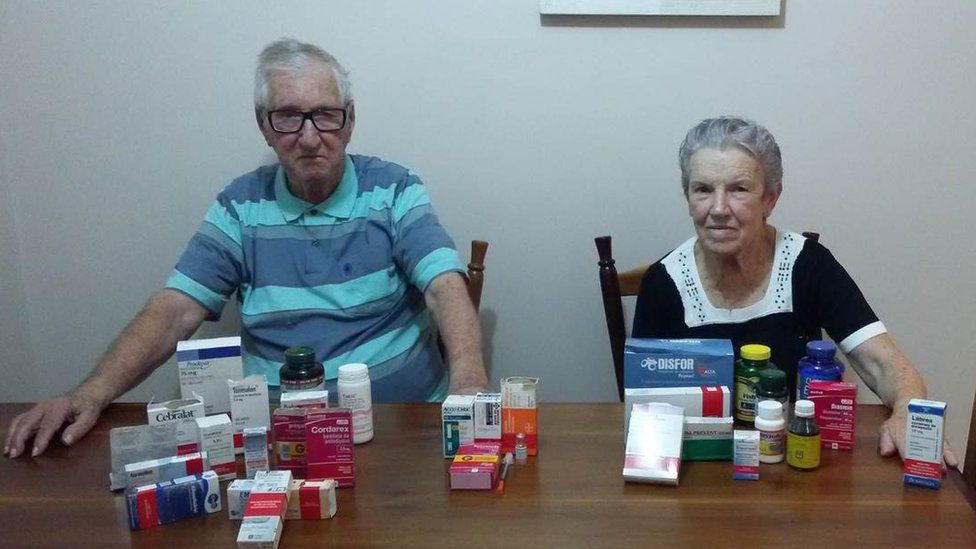Brazil's health system suffers as recession bites
- Published

The Zika virus outbreak continues to challenge public health systems throughout Latin America.
But nowhere has it posed as serious a threat as in Brazil, where the first reports of locally transmitted infection of the virus emerged in May 2015.
Zika would have posed a challenge to Brazil's health system at the best of times, but to make matters worse, it has come at a time when Brazil is struggling with its worst recession in two decades.
Government coffers are depleted and the 2016 federal budget for Brazil's decentralised universal healthcare system (Sistema Unico de Saude or SUS) has decreased by 3.8bn reais ($1.1bn; £724m).
According to the Brazilian constitution, citizens are entitled to free healthcare through its SUS healthcare system.
However, in recent years, it seems that the government has been failing to meet this constitutional right as it has come under increasing financial pressure.
Jose and Maria Stabelini are a married elderly couple living in the municipality of Santo Andre in Sao Paulo state.
For years, they have relied on Brazil's universal healthcare system and its pharmacies to obtain the medications they need to treat Mr Stabelini's diabetes and Mrs Stabelini's Alzheimer's disease.
In the past, they would simply travel to their local SUS hospital and present the necessary paperwork to receive their medication free of charge.
But since 2013, they have not been able to get their medication there.
An official at Sao Paulo's Department of Health said the bureaucracy involved in buying the medication and delayed deliveries from drug manufactures were to blame.
SUS pharmacies in Sao Paulo have not been provided with a steady supply of high-cost drugs by the Ministry of Health in the capital, Brasilia, leading to a backlog of patients waiting for their medication.
The result is that even the SUS pharmacies in Sao Paulo, one of Brazil's wealthiest states, can provide only the most common medications for free.
The more complex and expensive medications that the Stabelinis need are beyond SUS pharmacies' means.
Faced with this situation, their daughter Tania was forced to step in and help.
"To obtain medicine for my parents, I have to take the time to do research on the internet to see where the cheapest medicines are available [in private pharmacies]," she says.
"Then, myself, my brother and sister divide up the costs and travel to get them."
The Stabelini children have ended up having to pay for the parents' medicines out of their own pocket at private pharmacies, which they say has imposed a considerable financial burden on them.
Tania says they are not the only ones facing this problem.
"Because of the shortage of medicine through SUS, people are getting used to searching for medicine all over the place, for affordable medicine, which is often difficult to find.
"They search and if they find it, they buy it. At times many are unsuccessful."
'Not optimistic'
In order to avoid facing the same problems as her parents one day, she has decided to get private health insurance for herself.
But this is a costly option out of reach to most of Brazil's poor.
And Tania has little hope that the situation will improve. "I'm not optimistic, the government needs to invest more resources into SUS," she says.
Because access to medicine is a constitutional right in Brazil, some Brazilians have gone to court to force the state government to give them the medication that they need.
While the number of such lawsuits has increased in recent years, it is clearly a last resort for most.
And it is not just high-cost medication that there is a shortage of. There is also a lack of doctors and nurses working in the universal healthcare system.
Low pay and long hours in the SUS' primary care sector mean many medical staff opt instead for more lucrative salaries in the private sector.
With the spread of Zika and the extra demands the virus has made on Brazil's underfunded healthcare system, the government is at further risk of not meeting its citizens' constitutional rights to essential medicines and healthcare.
If Brazil is to re-emerge as a healthy and prosperous nation, the government will have to make tackling this problem one of its priorities.
- Published25 May 2016
- Published31 August 2016
- Published11 April 2012